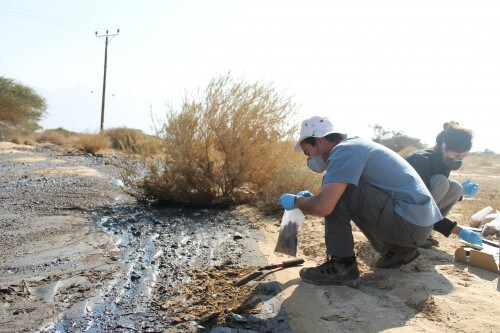More on the same topic: The Ministry of Environmental Protection is consulting with experts at the US Ministry of the Environment on land treatment in the past

A group of students from the Technion went to the Arabah to examine the possibility of restoring the soil through biological decomposition - decomposition of the oil using bacteria.
At the beginning of December, the Evrona Reserve in the Arava was damaged as a result of an oil pipeline leak. In the event, defined as the worst ecological disaster in the country's history, five million liters of crude oil leaked from the pipeline, contaminating the soil and causing extensive environmental damage. Following this, students from the Technion, all members of the Ma'ala group (Future Engineers for the Environment) mobilized to help.
The Maal'a group, consisting of about twenty students from various faculties at the Technion, was established in January 2014 with the aim of harnessing the knowledge learned at the Technion for the benefit of the environment. Young researchers and faculty members in the Environmental Engineering, Water and Agriculture Unit were roped in to accompany the group in the professional aspects. This is a student initiative, carried out entirely voluntarily.
"We arrived at the damaged area and met with the people of the Nature and Parks Authority, who are working to restore the reserve," said the founder of Ma'al, Uriel Keller, a student at the Faculty of Civil and Environmental Engineering. "We were amazed by the intensity of the damage. Black streams still flow in the reserve, and many oil puddles have flowed along them. Many animals died in the disaster and the vegetation is also black. This is a picture of a nature reserve that was destroyed.
"Our idea is to rehabilitate the soil using bacteria capable of digesting the oil and reducing the ecological damage. This has been tried in the past in oil spills around the world, such as the great oil spill in 2010 in the Gulf of Mexico. We sampled soil in several contaminated spots, and brought them to the lab at the Technion to find a natural population of bacteria in the soil that could digest the oil, using biological cultivation methods and advanced equipment. In the test, we will refer to hydrological, geological and ecological parameters to produce a computational model that will describe the treatment of the soil."
The student volunteers work under the guidance of Professor Uri Shavit from the Environmental, Water and Agricultural Engineering Unit, and Professor Sima Yaron from the Faculty of Biotechnology and Food Engineering.
The Ministry of Environmental Protection is consulting with experts at the US Ministry of the Environment on land treatment in the past
American experts for the treatment of soil contamination participated in the consultation. • According to the ministry's estimates, the treatment of the soil will last many months.
Last Thursday, the representatives of the Ministry of Environmental Protection held a conference call with the representatives of the EPA, the American Ministry of Environmental Protection. The conversation was held under the guidance of the deputy minister, Knesset member Ofir Akunis and dealt with the handling of the oil spill incident at the Ora well. The conversation was held between experts from the Ministry and experts from the American Ministry for the Treatment of Soil Infections with specialization in combustible infections.
Before the conversation, the ministry submitted a summary and review of the various actions taken as part of the oil spill event, as well as suggestions for continuation. The representatives of the EPA positively noted the way of work and the office's performance at the event in regards to the immediate activities that were done - pumping the oil, creating barriers in the ground for the spread of pollution and quick removal of the contaminated soil. On top of that, we gave a number of recommendations for the reconstruction of the area after the disaster which will be examined and considered by the ministry's experts. The ministry is working to bring about a situation where the land will not pose a risk to travelers, animals and vegetation in the shortest possible time. However, full restoration is expected to take a long time.
The incident of the oil spill in Beer-Ora that happened at the beginning of the month is wide-ranging and has heavy consequences for the environmental balance, the vegetation and the animals in the reserve. As a reminder, Katsa reported that 5 million liters of crude oil leaked over an area of approximately 144 dunams. About 90% of the oil has already been extracted from the ground.
Under the direction of Deputy Minister Akunis, the Ein Evrona reserve will remain closed to travelers even during the Hanukkah holiday, in order to preserve the health of the travelers. RTG inspectors continue their patrols and deny access to travelers.
